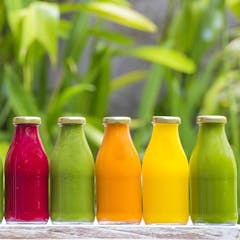
Articles on Diet
Displaying 281 - 300 of 667 articles

Foods rich in flavonoids (such as apples, berries, or tea) are important for cognitive health, research suggests.

Eating healthy food, exercising regularly and reducing stress are all measures we can take to stay as healthy as possible to fight off infection while we wait for a coronavirus vaccine.

A spike in flour sales and an increase in home cooked meals could signal the start of a new healthier relationship with food.

Childhood, adolescence, pregnancy, menopause, 75+: how your diet should change with each stage of life
The Conversation, CC BY56.6 MB (download)
Once you get older, the focus moves to trying not to lose your muscle tissue. So as you age, your protein requirements actually start to go up.

The adverse symptoms some people experience after adopting the ketogenic diet is known as the “keto flu”.

To boost your immune defenses against corona and other viruses, one of the most effective things you can do is maintain your natural circadian rhythms. Here’s how to do that.

Research shows a wider impact than you might think, including on mental health and pain.

We’re hardwired to love sweet things, but too much sugar is leading to an increase in type 2 diabetes. Here’s what individuals and policymakers can do cut our collective sugar intake.

PODCAST: The second episode of our series on the personalisation of healthcare focuses on your diet.

Olive oil, grapes and fish. There’s a lot to love about the Mediterranean diet but focusing on it might be a way to exclude other healthy and global diets.

The FODMAP diet was developed to reduce the symptoms of irritable bowel syndrome. But as it grows in popularity, online bloggers and ‘health gurus’ are promoting it for a range of unusual purposes.

Americans love their supplements, but some of the products are contaminated with heavy metals, bacteria and toxic fungi. The FDA has little control because of a law passed in 1994.

A study of Ghanaians living in northern England provides insight into how eating habits change through the generations.

Plant-rich diets can help tackle the climate crisis, prevent disease and improve mental health.

And why they may be about to change their diets in the years ahead.

Vitamin D is essential for good health and particularly for fighting infections and keeping the microbes in the human gut healthy. But in winter it can be difficult to get enough.

With summer upon us, some people may be hoping to shed a few kilos. Although a quick-fix can be tempting, to keep the weight off in the longer term, here’s how to steer clear of the fads.

Excessively eating junk foods during adolescence could alter brain development, leading to lasting poor diet habits. But, like a muscle, the brain can be exercised to improve willpower.

Everyone knows it’s hard to stop eating potato chips or chocolate chip cookies. New research shows why: Certain combinations of fat, sodium, sugar or carbohydrates make them irresistible.

Many argue the key to helping low-income Americans eat healthier is eliminating food deserts. A new study suggests this doesn’t help.
